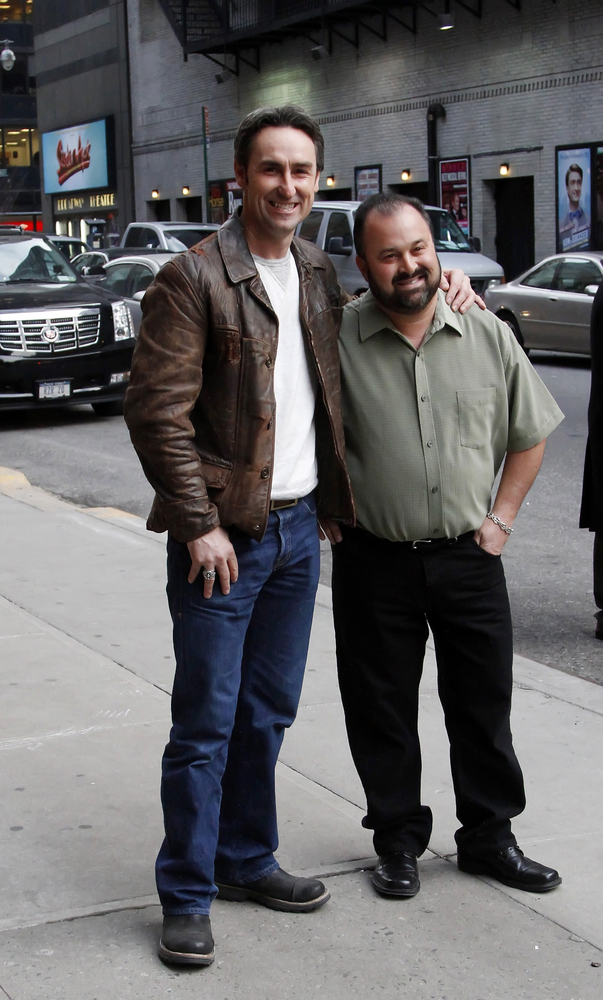Fans are devastated at the news that Frank Fritz, the antiques expert who gained fame on the reality series American Pickers, has died at 60.
Fritz, who left the series in 2021, had been suffering from health problems and was hospitalized from a stroke two years ago.

The news was announced by Fritz’s friend and co-star Mike Wolfe, who said that Fritz passed away last night.
“I’ve know Frank for more [than] half my life and what you’ve seen on TV has always been what I have seen, a dreamer who was just as sensitive as he was funny,” Wolfe wrote in a social media tribute. “The same off camera as he was on, Frank had a way of reaching the hearts of so many by just being himself.”
Fritz and Wolfe gained fame as the hosts of the reality TV series American Pickers, which premiered on the History Channel in 2010. The series showed the two “pickers” traveling across the USA, searching for valuable antiques and collectibles in unexpected places.

“We’re looking for amazing things buried in people’s garages and barns,” the show’s opening narration explains. “What most people see as junk, we see as dollar signs. We’ll buy anything we think we can make a buck on.”
“We make a living telling the history of America… one piece at a time.”
The series attracted millions of viewers, becoming one of History Channel’s most popular programs. In its debut year it was the #1 non-fiction series among total viewers and adults 25-54.
While the antiques were often interesting, there’s no doubt it was the chemistry and charisma of the two hosts that kept viewers coming back for more.

In 2021, it was announced that Fritz would be leaving American Pickers after a decade on the hit series. Fritz said the decision was not his own, and that he was pushed out by the network after a back surgery.
“I didn’t leave the show,” he told The Sun at the time. “I finished shooting and then I had a little back surgery and the pandemic came.”
He also suggested that his co-host’s ego was a factor, saying the show had “tilted towards him 1,000 percent.” “I haven’t talked to Mike in two years,” Fritz said. “He knew my back was messed up, but he didn’t call me up and ask how I was doing. That’s just how it is.”

In July 2022, Fritz was hospitalized from a stroke. In 2023, he had a tearful reunion with Mike Wolfe, and the two resolved their purported feud. However, Fritz declined an offer to rejoin American Pickers, deciding to focus on his health.
It’s clear that the two former co-hosts have remained friendly since then, and it seems Wolfe was by his side til the end.
“We’ve been on countless trips and shared so many miles and I feel blessed that I was there by his side when he took one last journey home,” Wolfe wrote on Instagram. “I love you buddy and will miss you so much I know [you’re] in a better place.”
American Pickers remains a staple of the History Channel lineup. Fritz has never officially been replaced as co-host, though series regulars like Danielle Colby, Mike Wolfe’s brother Robbie, and friend and antiques expert “Jersey Jon” Szalay will rotate accompanying Wolfe on his antiquing trips.
Colby also shared her own tribute to Fritz on social media. “Frank, I will miss your ability to make everyone laugh, your love for talking tattoos, your epic collections but what I will miss the most are those little glimpses of vulnerability from time to time,” she wrote.
“Frank, you loved your cat and your momma and we bonded on those things. You will be missed for all of these reasons and so many more.
Rest in Peace Road Dog.”
Rest in peace to the iconic reality TV star Frank Fritz 😢🙏 Please share this story in his memory.
12 Comics That Show the Real Struggles of Modern Women
Each modern woman has their own struggles when it comes to their family or job. Yet, there are some things that many of us can relate to and they would seem annoying if they weren’t so funny, like going to the shop to buy shoes but ending up with 3 sweaters instead.
We at Bright Side know that modern women are powerful, but we think there should still be a place for humor in their lives. Here you can find 12 comics about girls and their funny problems.
1. When you have to wear a strapless bra to show your beautiful back

2. When you decided you want to wear a dress today

3. When you bought a new red lipstick but figured out that it’s not as provocative as you thought

4. When you decided to make a nice dinner for yourself

5. When you chose XS instead of S hoping your diet worked

6. When it’s time for the most important beauty procedure

7. When you spend an hour trying to curl your hair

8. When you start doubting that all your beauty products actually work

9. When you bought a subscription to yoga classes and have to force yourself to go after work

10. When your photographer for official documents didn’t show you the pic before printing it

11. When your deodorant is magically visible on every item of clothing you own

12. When depression arrives and you need a change

What is the funny little struggle that you face often? What do you think about the life of modern women? Is it easier than before?
Got some cool photos or stories and want to be featured on Bright Side? Send them all right HERE and right now. Meanwhile, we’re waiting!



Leave a Reply